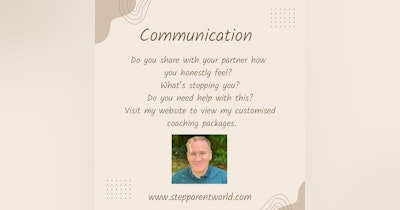Dealing with a High-Conflict Ex
When you meet someone new, one thing you might not be prepared for is a toxic ex. Yes, you understand that to some extent your partner will have contact with their ex due to custody arrangements for their children. While this may always feel a little awkward, how do you deal with your partner's ex when they seem intent on causing as much difficulty for your partner and you - as well as your stepchildren - as possible? Welcome to the world of the High Conflict Ex.
What do we mean by a high conflict ex? (HCE)
In short, a high conflict ex-partner sees things very differently to the way you or your partner do. They seem to thrive on fighting with your partner and you, creating chaos and generally causing problems. The conflict unfortunately revolves around the children and involves everything from school schedules, school activities, contact times and even drop off and collection days.
They tend to want to escalate conflict rather than try to find a satisfactory solution for everyone. They can be uncompromising and unforgiving of anyone who does not agree with them. They find it difficult to manage their emotions as well as their reactions to some situations. If they get upset, it can take longer for them to calm down and can cause people around them to walk on eggshells for fear of upsetting them further. They use these emotions to control their children as, very sadly, children unwittingly become involved and worry about upsetting them.
Other particularly unhelpful traits include feeling that any disagreements are nothing to do with how they behave. They never seem to recognise that what they say or do has any bearing on an argument or disagreement. They refuse to accept that their behaviour may be playing a part. You can rationalise and reason as much as you want, but unfortunately it can be impossible to change the HCE into seeing that what they are doing is having a damaging effect on their children and the situation.
High conflict people display very little compassion or empathy and unfortunately this can include in their dealings with their own children. They're often more concerned about how they are feeling and absorbed in their own emotions. A typical hallmark of the HCE is how they can strike out at their ex-partner over the smallest detail, not caring who it hurts or what could be the long-term outcome. They might see any decision your partner or you have made regarding the children as a personal attack on them, and that you are deliberately out to annoy or anger them. Their reactions can often have no regard for how this may affect the children.
Sabotage
A toxic ex will try everything they can to sabotage your relationship with their ex-partner. They will make it clear to you that they can cause trouble to your new relationship as a way of deterring you - after all, most people would think twice before getting further involved in a relationship with someone whose ex is troublesome and meddling. They might also try to turn the children against you from the outset. They tend to blame their ex for anything and everything that is going wrong in their own lives.
For you as well as your partner this can be a very difficult time and sometimes it can take time to spot that this behaviour is that of a High Conflict person.
Some questions to ask yourself. Do you feel like your partner's ex is?
- trying to control everyone and everything
- emotionally abusive
- unbelievably difficult with everything
- denying or shifting the blame
- using the children to upset your partner and you
- showing a sense of entitlement
- lacking empathy
-gaslighting
- envious of others?
If they can upset the apple cart, then they will try to find a way to cause as much trouble as they can. They may well try to compete with you. For example, if you buy your stepchild a birthday present - they will buy something bigger or more expensive to belittle you.
False allegations and spreading rumours are all things a toxic ex may try against you and your partner. They'll say things like: "You’re a bad step parent, you’re selfish and treat the children badly". Sometimes, they'll try to get social services involved by making up stories about you.
Gaslighting
Gaslighting is a form of emotional abuse in relationships. It is deliberate manipulation to make people question their thoughts and emotions and doubt their own version of events.
Examples in a relationship:
- being abusive and then denying it happened
- downplaying abuse by convincing their partner that they are “too sensitive"
- undermining their partner's version of events and reality
- making their partner question their judgement
- making their partner second guess their own perceptions
- lying to their partners, never backing down or changing their story.
It's exhausting, frustrating and sometimes frightening dealing with a High Conflict Ex - whether it's your own or your partner's, but here are some useful tips to help:
Creating Boundaries
- If you have to communicate with the ex-partner only, do it via email or a parenting portal such as Talking Parents. These can provide documented evidence in court if needed and are a better way to make sure there's no so actual contact between the biological parents.
- Block them on social media so they cannot see what you and your partner are doing or where you are going.
- If the ex must call for any reason it should be done at certain times that suit you and your partner. Don't take calls from the ex if they are outside these times and dates. Also don't agree to change times and dates - if you do this once, the ex will continue to keep changing timings which will create stress and confusion.
- Discuss with your partner how the drop off and collecting of the children will be arranged for visitation. Arrange for drop offs/pick-ups to be in neutral place so that the ex does not need to come to the house. Do not accept bad mouthing - don't bad mouth your ex to your children.
Working together with your partner to agree to these boundaries will protect you and helps to keep your relationship with your partner solid and strong. The best way to set these boundaries is to get clear on them. Plan and stay consistent. If you need to make any changes, arrange for your partner to email the ex-rather than call.
Dealing with a toxic ex-partner is draining and can be very challenging to your own relationship with your partner. Stay united and deal with everything together. If you have a disagreement, then sit down calmly and come to conclusion that satisfies you both. Your relationship is a top priority if you want to create a healthy and functional family.






